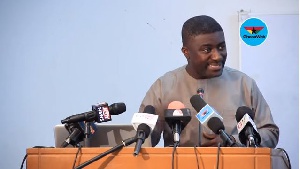 Deputy Chairperson of the Electoral Commission, Dr Eric Asare Bossman
Deputy Chairperson of the Electoral Commission, Dr Eric Asare Bossman
Excessive partisanship and political mistrust by the two dominant political parties - the New Patriotic Party (NPP) and National Democratic Congress (NDC) is the reason for the high cost of Ghana's general election.
Dr Eric Asare Bossman, a Deputy Chairperson of the Electoral Commission (EC) who revealed this noted that the cost of elections in Ghana was the exceptionally high compared to other countries in the Sub-Saharan Africa, and even the USA and described it as “worrying”.
This, he explained was as a result of the over politisisation of issues and the high level of mistrust that had compelled the EC to adopt well thought-out technological and all inclusive electoral processes to build trust as well as preserve the integrity of the system.
Dr Bossman was speaking at the Central Regional consultative engagement on the implementation of Representation of the People’s Amendment Act ( ROPAA) in Cape Coast.
According to him, there was pervasive falsehood and mistrust in Ghana’s political front as well as the electoral processes which had generated unnecessary political tension and occasional disturbances that if allowed to fester could endanger the peace and stability of the nation.
"There is too much falsehood and mistrust among many in the society today. Even traditional and religious leaders, Presidents and many others of high repute are required to dip their fingers in the ink indicating the mistrust in the political system”, he noted.
Dr. Bossman, however, stated that Ghana’s electoral system was one of the best in the world, and the EC was determined to improve on its records with constant reforms and stakeholder engagements to promote transparency and accountability to reduce the rising cost of elections.
He urged political parties to educate their members to cooperate with the EC to enable it to execute its mandate of ensuring fair and transparent elections.
Accordingly, they must support and not seek to undermine the electoral processes and reforms through violence, intimidation, unfounded accusations or any other unlawful acts.
The EC had not taken any step towards general election without consulting the various stakeholders, for which reason “all participants must behave in a way that promoted a free and fair process, Dr Boss man added.
To ensure inclusiveness in the process and build the confidence and trust of political parties, the Commission holds regular Inter-Party Advisory Committee (IPAC) meetings to provide detailed procedural information on its work,” he said.
Free and fair elections, he stressed, depended on multiplicity of actors, including; electoral management body, the political parties, law enforcement agencies, media, Government, Judiciary and the electorate who equally had to play their roles effectively for the desired peaceful elections.
Meanwhile traditional rulers in the Region have asked that the implementation of RO PAA was deferred to enable the EC to examine and analyse all concerns raised by the public to forestall any future confusion during elections.
Among some of the issues raised during the Central Region engagement were the time differences across the globe, which could breed mistrust if election results were delayed as a result of differences in the time of voting and whether Ghanaians abroad will have to come home to vote during general elections.